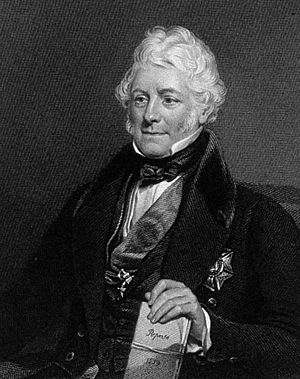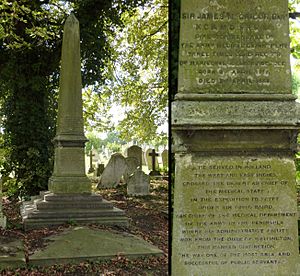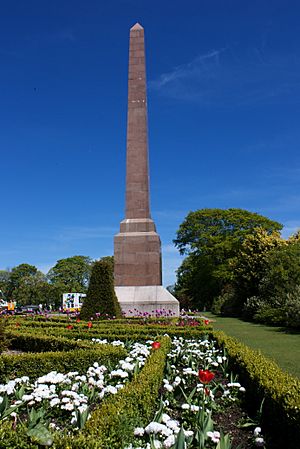James McGrigor facts for kids
Sir James McGrigor (born April 9, 1771 – died April 2, 1858) was a very important Scottish doctor. He was a military surgeon, which means he took care of soldiers. Many people believe he was the main person who helped create the Royal Army Medical Corps. This group is still very important for army health today. He also led the University of Aberdeen for a time.
Contents
Growing Up and Learning
James McGrigor was born in a place called Cromdale in Scotland. His father, Colquhoun McGrigor, was a clothing seller. James went to Aberdeen Grammar School for five years. After that, he studied at the University of Aberdeen and finished in 1788. He then went to the University of Edinburgh in 1789 to learn more about medicine.
Working as an Army Doctor
Helping Soldiers in Spain and Portugal
In 1811, James McGrigor became the main surgeon for the Duke of Wellington's army. This was during the Peninsular Wars (1808–1814) in Spain and Portugal. He was in charge of all the medical care for the soldiers.
Leading the Army Medical Service
Before the famous Battle of Waterloo, McGrigor returned to Britain. He was honored with a knighthood in 1814. From 1815 to 1851, he was the Director-General of the Army Medical Services. This meant he was the top doctor for the entire British Army.
He made many big changes to improve how soldiers were cared for. For example, he brought the stethoscope into use in 1821. This tool helps doctors listen to sounds inside the body. He also set up field hospitals close to battles for injured soldiers. McGrigor worked hard to make sure hospitals were cleaner and more hygienic.
In 1831, he was given the special title of Baronet. In 1850, he became a Knight Companion of the Order of the Bath (KCB).
How Sir James McGrigor is Remembered
Sir James McGrigor wrote a book about his life, which was published in 1861. There are several monuments to remember him.
Monuments and Statues
An obelisk, which is a tall, thin stone pillar, was put up in Aberdeen in his memory. It is now in Duthie Park. A statue of McGrigor was also placed at Chelsea Hospital in London in 1865. This statue was paid for by many people who wanted to honor him. The statue was later moved to the Royal Military Academy Sandhurst in 2002.
McGrigor Barracks
A place called McGrigor Barracks was built in the 1890s in Aldershot, England. These army buildings were named after him. This shows how important his work was for the military.
|
 | Sharif Bey |
 | Hale Woodruff |
 | Richmond Barthé |
 | Purvis Young |




